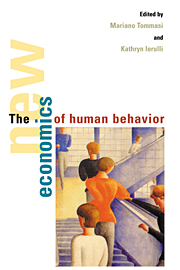Book contents
- Frontmatter
- Contents
- Contributors
- Preface
- Introduction
- PART I DISCRIMINATION AND IMMIGRATION
- PART II CRIME, PUNISHMENT, AND RIGHTS
- PART III ALL IN THE FAMILY
- 5 Human capital, fertility, and economic growth
- 6 Marriage market models
- 7 The marriage premium
- PART IV GOVERNMENT AND POLITICS
- PART V HEALTH, RELIGION, AND MASS BEHAVIOR
- Index
7 - The marriage premium
Published online by Cambridge University Press: 03 December 2009
- Frontmatter
- Contents
- Contributors
- Preface
- Introduction
- PART I DISCRIMINATION AND IMMIGRATION
- PART II CRIME, PUNISHMENT, AND RIGHTS
- PART III ALL IN THE FAMILY
- 5 Human capital, fertility, and economic growth
- 6 Marriage market models
- 7 The marriage premium
- PART IV GOVERNMENT AND POLITICS
- PART V HEALTH, RELIGION, AND MASS BEHAVIOR
- Index
Summary
Married men earn higher wages than single men. Married men are older, better educated, and have more stable employment histories — characteristics associated with higher wages for all workers, married or not. But these differences in characteristics can only partly explain the difference in wages. Economists and others have proposed several explanations for the remaining marriage premium. One explanation that has not received the serious attention it deserves is that marriage raises productivity. In this chapter I describe a model of family behavior that explains how it might do so.
The existence of a marriage premium for men is well established. It has been documented in several countries and in the United States as early as the nineteenth century. It remains after accounting for differences in workers' health and the attributes of each worker's job — how dirty, strenuous, challenging, or otherwise unpleasant or pleasant. Estimates of the male marriage premium range from about 10 to 35 percent. Its size differs according to the age and race of the men considered, being larger for older men and for white men. Overall, women do not earn a significant marriage premium.
It is worth noting that some features of marriage tend to lower, not raise, wages.
- Type
- Chapter
- Information
- The New Economics of Human Behaviour , pp. 113 - 126Publisher: Cambridge University PressPrint publication year: 1995
- 23
- Cited by



